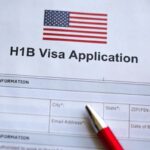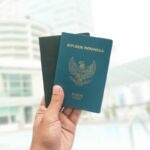In his second Republican presidential debate, Indian-American presidential aspirant Vivek Ramaswamy made headlines by expressing his support for ending birthright citizenship for children born to illegal immigrants in the United States.
The debate, part of the 2024 election cycle, took place at the Ronald Reagan Presidential Library and Museum in Simi Valley, California, and featured Mr. Ramaswamy alongside six other candidates, including Florida Governor Ron DeSantis and former United Nations Ambassador Nikki Haley.
Revisiting a Controversial Proposal
Responding to a question about the legal basis for expelling undocumented immigrants and their American-born children, Vivek Ramaswamy invoked a 2015 proposal from then-candidate Donald Trump. This proposal sought to terminate birthright citizenship, as reported by the Washington Post on Wednesday.
Constitutional Complexity
The debate over birthright citizenship centres on the first section of the 14th Amendment to the US Constitution, which states that “All persons born or naturalized in the United States, and subject to the jurisdiction thereof, are citizens of the United States and of the State wherein they reside.”
While the prevailing belief has been that this grants citizenship to anyone born on US soil, some legal scholars argue that the phrase “and subject to the jurisdiction thereof” leaves room for government interpretation and potential restrictions.
Ramaswamy’s Argument
Mr Ramaswamy’s argument hinges on the assertion that children born in the United States to undocumented immigrants should not be granted citizenship because their parents entered the country unlawfully.
A Broader Stance
During the debate, the 38-year-old second-generation Indian-American also aligned himself with other Republican candidates by endorsing additional measures. These measures include the militarization of the southern border, defunding so-called “sanctuary cities,” and discontinuing foreign aid to Mexico and Central America.
A Bold Move
However, Ramaswamy went a step further by proposing the elimination of birthright citizenship for the children of illegal immigrants, a move that set him apart from his competitors. His stance on immigration also extends to the H-1B visa program, a topic he previously criticized.
Ramaswamy advocates for overhauling the current “lottery” system and replacing it with a merit-based immigration scheme tailored to the needs of the United States.
H-1B Visa Connection
Interestingly, Ramaswamy’s position on H-1B visas bears some resemblance to Donald Trump’s 2016 campaign rhetoric. Trump, who had also employed foreign workers through H-1B visas for his businesses, initially adopted a hardline stance on these visas before later softening his stance.
A Note on Ramaswamy’s Own H-1B Use
It’s worth noting that Ramaswamy himself utilized the H-1B visa program 29 times. According to Politico, from 2018 through 2023, the US Citizenship and Immigration Services approved 29 applications from Ramaswamy’s former company, Roivant Sciences, to hire employees under H-1B visas.
Gaining Momentum
Vivek Ramaswamy has been gaining attention since his debut in the Republican presidential primary debate on August 23. The first post-debate poll indicated that 28 per cent of 504 respondents believed Ramaswamy performed the best, further propelling his candidacy.
A Standout Candidate
Ramaswamy’s bold policy proposals have set him apart in the crowded primary field, earning him recognition in US media reports. As the 2024 election cycle unfolds, his positions on immigration and citizenship continue to be closely scrutinized by both supporters and critics alike.
(Source and Inputs From PTI News)
Follow and connect with us on Facebook, Twitter, LinkedIn, Instagram and Google News for the latest travel news and updates!





